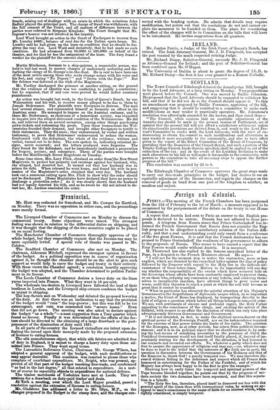SCOTLAND.
The Town Council of Edinburgh debated the Annuity-tax Bill, brought in by the Lord Advocate, at a long sitting on Monday. Two propositions were placed before the Council. One was moved by Baillie Johnston. He proposed that the Lord Advocate should be requested to withdraw his bill, and that if he did not do so the Council should oppose it. To this an amendment was proposed by Baillie Forrester, approving of the bill, and suggesting that it should be remitted to a committee to make such modifications as may render it practically operative. Mr. Johnstone's resolution was afterwards amended by the mover, and then stood thus-
" The Council, while anxious that an equitable adjustment of the Annuity-tax should be made in the present session of Parliament, are of opinion that the present bill will not afford a satisfactory settlement unless its objectionable provisions are deleted from it, and remit to the Lord Pro- vost's Committee to confer with the Lord Advocate, with the view of en- deavouring to obtain his consent to such modifications and alterations as may render it more acceptable to the community, and also to have effect given to the report of the Select Committee of the House of Commons, by providing that the Deaneries of the Chapel-Royal, and such a portion of Trinity College Church funds therein specified, shall be applied in aid of the extinction of the tax : and in the event of his Lordship declining to make such alterations in his bill as will make it favourable to the community, with powers to the committee to take all necessary steps to oppose the further progress of the bill."
This resolution was carried by 22 to 9.
The Edinburgh Chamber of Commerce approves the great steps made to carry out free-trade principles in the budget, but desires to see an equitable adjustment of the Income-tax, and regards the charges on the removal of goods .in bond from one part of the kingdom to another, as needless and unjust.


























 Previous page
Previous page